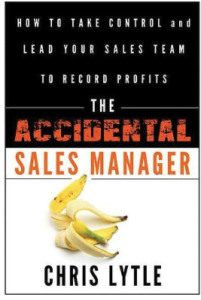
I bought this book when I moved over to a sales position. I wanted to prepare myself (again) mainly for the management side of things. But, thsi book surprising had some great insights on sales and so forth. Here’s a few of the key bullets:
- When you get promoted, you get paid more for doing less of what you did really well.
- Stages of new work:
- Phase 1 – Unconscious Incompetent – You don’t know what you don’t know.
- Phase 2 – Conscious Incompetent – You know what you don’t know.
- Phase 3 – Conscious Competence – You know what you’re doing.
- Phase 4 – Unconscious Competence – It’s as easy as breathing.
- You can’t get frustrated with people who don’t know. You can’t let teaching get old.
- Don’t crush egos or make people afraid to raise their hands when they need help.
- I don’t always have to chime in on every situation. When I don’t, people just do their jobs.
- If you were a better sales person, you’d been able to turn terrible prospects into good clients. Your company would have trusted you with larger accounts…”
- Different strategy:
- Sales | Drives self vs. Manager | Finds what drives team
- Sales | Constant sense of urgency vs. Manager | Practice patience and use urgency sparingly
- Sales | Doer vs. Manager | Organizer
- Sales | Generating revenue vs. Manager | Driving revenue
- You get paid for progress, not perfection.
- We’re more open to feedback at the bottom of the mountain, not at the top.
- Barking orders rarely works long. Listening and adapting is the better route.
- People rarely resist their own ideas.
- Counseling is the act of advising people on personal problems. Coaching is helping overcoming sales problems.
- Listen… for when people are giving you feedback on what you want to hear. e.g., “How’s the sales visit go.” “It went well! We talked for like 90 minutes.” “Oh, did they commit to anything? Did they have a timeline.” “No, they’ll want to talk again in a few months.” “Hmm… it doesn’t sound like it went too well.”
- Salespeople need to ask tough questions. “Anything that would prevent us from working together right now?”
Catch people off guard a bit to see what the real story is. - Losing business is already heart wrenching. Sales people don’t need to feel worse when losing more work.
- There are plenty of wonderful in people in sales. But there are few great salespeople.
- Sales people who add value get longer meetings and more referrals. Info-led sales approach.
- Great salespeople don’t need to be liked. They’re not you’re enemy, but not your bestfriend.
- “price objection training”
- There’s a difference between business and personal dollars.
- A players orchestrate the sale. B players accommodate the buyer.
- The worst time to start recruiting is when you have an opening. ‘
- Learning is like a faucet with a slow leak. There’s never a giant tsunami of understanding.
- The real learning is when people take the content they’ve been given, and then discuss it and modify for their own style.
- Lifelong learners get more out of life.
- I cannot teach anybody anything. i can only get them to think. (This is the Socratic method of asking questions to gain understanding on both sides.)
- It’s very easy – yet ineffective – way to teach people threw lecture. Be interactive. Ask questions. Go!
- Customers won’t judge us by our mistakes, only to our response to those mistakes.
- No means Not now. Selling is solving. People buy the WAY you seell more than they buy WHAT you sell
- If you aren’t measuring it, you’re not managing it.
- Always as a sales person, figure out the next step to move the client in the sales process.
-
For meetings:– Would people still attend if it was optional? It’s important to give others roles (you’ll present on this, etc.)
